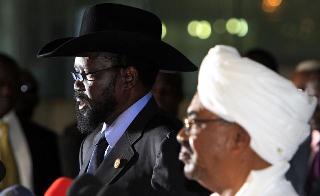South Sudan accuses Khartoum of violating Addis Ababa deal
By Ngor Arol Garang
February 14, 2012 (JUBA) – South Sudan on Tuesday accused Khartoum of violating the recently signed memorandum of understanding on non-aggression and cooperation, by preventing the movement of barges back to Juba.

He described Khartoum’s actions as a “clear violation” of the African Union High-level Implementation Panel-brokered memorandum, signed by the neighbours in Addis Ababa last Friday.
D’Agoot said the seized barges were intended for the repatriation of displaced South Sudanese currently stranded in Kosti, north Sudan.
Juba claims that Khartoum is suspecting that the barges will be used for transporting troops to already tense border regions.
South Sudan which seceded in July 2011, has seen the mass migration of South Sudanese living north of the border back to their homeland. With separation, South Sudan took with it 75 percent of the oilfields.
D’Agoot also claimed that an attack in Unity state took place on a South Sudan army post in Jau payam [district] of Pariang county. This corroborates allegations made by the Unity state governor, Taban Deng Gai and county commissioner, Mabeak Lang Bilkuei on Monday; that Khartoum attacked Jau last week.
Al-Sawarmi Khalid Sa’ad, spokesman for Sudan’s military, said after clashes in 2011 that Jau was “inside the Republic of Sudan”.
However, Philip Aguer, spokesperson for South Sudan’s military said Jau “is in South Sudan, there is no dispute about that. Jau is deep in South Sudan.”
D’Agoot also accused Khartoum’s Sudan Armed Force (SAF) of attacking Raja county of Western Bahr el Ghazal State, which borders north Sudan.
In South Kordofan state, north Sudan, which borders Unity state, SAF is in conflict with the Sudan People’s Libearation Army – North rebels.
Maker Benjamin Bil, another senior government official in the ministry of information told press at the briefing that Juba has refrained from retaliating in kind, not because South Sudan cannot defend itself militarily, but because a diplomatic solution is in the best interest of both states.
However, Bil warned that South Sudan “will not hesitate in defending [itself] if we are forced to do so.”
In November 2011 the UN condemned SAF’s bombardment of the Yida refugee camp, also in Unity state.
Governor Gai claimed on Monday that Khartoum attacked his oil-rich state by land and air in response to Juba’s decision to halt oil-production.
Juba claims Khartoum confiscated US$350 million worth of South Sudanese oil in lieu of extortionate transit fees of US$32 per barrel. Land-locked South Sudan has been pushed into a corner as the only pipeline it uses passes through its northern neighbour to the coastal city of Port Sudan.
Juba has signed memorandums of understanding with Kenya and Djibouti on the construction of alternative pipelines, the feasibility of which remains uncertain.
The Addis Ababa talks failed to reach a settlement that would allow Juba to continue oil production. This has resulted in an economically precarious situation as oil accounts for 98 percent of South Sudan’s budget.
D’Agoot praised the decision to halt oil production saying it demonstrates that South Sudan achieved “economic independence”.
(ST)
